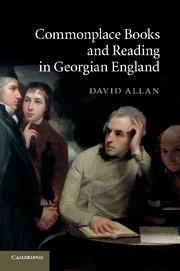Book contents
- Frontmatter
- Contents
- List of abbreviations
- Acknowledgements
- PROLEGOMENON
- PART I ORIGINS
- PART II FORM AND MATTER
- PART III READERS AND READING
- PART IV ANCIENT AND MODERN
- PART V TEXTS AND TASTES
- 12 Taming the Bard: dramatic readings
- 13 Commonplacing and the modern canon
- PART VI ANATOMISING THE SELF
- ENVOI
- Bibliography
- Index
13 - Commonplacing and the modern canon
Published online by Cambridge University Press: 03 May 2011
- Frontmatter
- Contents
- List of abbreviations
- Acknowledgements
- PROLEGOMENON
- PART I ORIGINS
- PART II FORM AND MATTER
- PART III READERS AND READING
- PART IV ANCIENT AND MODERN
- PART V TEXTS AND TASTES
- 12 Taming the Bard: dramatic readings
- 13 Commonplacing and the modern canon
- PART VI ANATOMISING THE SELF
- ENVOI
- Bibliography
- Index
Summary
To works, however, of which the excellence is not absolute and definite, but gradual and comparative; to works not raised upon principles demonstrative and scientifick, but appealing wholly to observation and experience, no other test can be applied than length of duration and continuance of esteem.
Samuel Johnson, Dictionary of the English Language (1755)The evidence of commonplacing confirms that, by the end of our period, Shakespeare stood head-and-shoulders above all other writers in readers' esteem. Other authors, however, also experienced popular appropriation to varying degrees, as the reading public added meaningful substance to the critics' progressive outlining of an English literary canon. Most of these writers, of course, in an age of expanding and more diverse authorship, were of rather more recent vintage than the greatest of the late Tudor playwrights: indeed it was intrinsic to canonisation, as advocates like the Wartons insisted, that it should connect the past high points of English literary endeavour with the paramount practitioners of the present. As with Shakespeare, moreover, there are a number of interesting questions to be answered about the role of commonplacing in encouraging certain styles of writing, and not least specific types of poetic text, to be widely embraced by ordinary readers. For example, to return to a point raised in Chapter 10, how far was the popularity of the heroic couplet in eighteenth-century poetry a consequence of the fact that, in yielding easily identifiable and free-standing subdivisions for convenient extraction, this particular form was actually so well adapted to commonplacing's strongly epigrammatic preferences?
- Type
- Chapter
- Information
- Commonplace Books and Reading in Georgian England , pp. 196 - 212Publisher: Cambridge University PressPrint publication year: 2010



